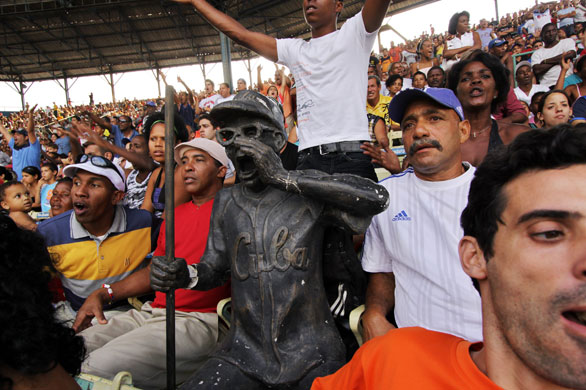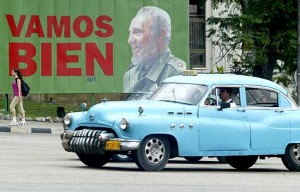
Millions of Cubans are beside themselves with delight. The biggest sporting competition in Cuba starts on Sunday, November 28th in the old Cerro Stadium, today called the Latinamerican Stadium. And they’re celebrating the 50th season of baseball, the King of Sports on the island.
January 14, 1962, in his inseparable olive green uniform and a pair of cheap sunglasses, Fidel Castro inaugurated the first national series with amateur players. On that day, he said “it is a triumph of free ball over slave ball”, referring to professional baseball which before 1959 was played in the country.
A lot of water has gone under the bridge since then. The Latinamerican, the biggest stadium in the country, the home stadium of the Industriales, Havana’s home team and current champion, has no artificial lights and presents a lamentably deteriorated state.
The national series is surrounded by debate. Like the case of Frederic Cepeda, one of the best ballplayers who mysteriously wasn’t a member of the national team which took part in the 17th World Cup celebrated in Taipei, and afterwards, stayed off his team, the Roosters of Sancti Spiritus.
Such was the resulting hullabaloo, that some days before the inauguration of the new season the sporting hierarchy decided that Cepeda would be a member of the team from Sancti Spíritus. One interview with the ballplayer was published in the local newspaper, Escambray.
One would hope that in the press conference called for Tuesday the 25th, they’d give more details and clear up the situation of other players excluded from the national series. The lack of information usually makes of all classes of rumors and speculations explode among fans.
It is then when people try to find out what is said or published in Miami. From the Miami press some recent declarations of Antonio Castro, son of el Comandante, an orthopedic doctor by profession and vice president of the Cuban Baseball Federation were extracted.
According to his comment, during the celebration of the World Cup in Taipei, Castro made a proposal to permit that Cuban ballplayers could play in the professional leagues of other countries.
In the other ear also arrived the name of the latest “deserter”: Yasiel Balaguer, 17 years old, who excelled as a first caliber batter.
“Ball”, as the Cubans call baseball, is the only spectacle capable of filling a place made for 55,000 people not called together by the government. But owing to official censure, its millions of fans cannot follow the best leagues in the world, like those of the United Stats, Japan, South Korea, the Dominican, Mexico, or Venezuela.
Ball, besides, is a question of State. The teams for the national series correspond to the seats of the provincial communist parties. Among the tasks of the First Secretary of the Party in any province is that of attending to the material needs of his territory’s team.
Although more than 350 ballplayers have deserted in the last twenty years, the governmental press maintains its usual silence. The people find out from foreign newspapers; e-mails from friends who live abroad, or on Radio Martí — United States government broadcaster — which since 1985 transmits to the island and whose signal is strongly jammed by Cuban military engineers.
To try to stop the incessant flow of desertions, they’ve made living conditions better for the players during the national campaign. They travel in air-conditioned buses, sleep in comfortable hotels, and eat their fill. Even so, they earn laborers’ salaries. And because of that, at the first sign of change, they abandon their Fatherland to play as professionals, and in not few cases, earn salaries with six zeros*.
Secrecy and mystery surround matters related to baseball in Cuba. Nobody questions the professionalism of the official journalists, but their lack of cojones is criminal when it’s time to communicate and debate the red-hot themes, with the exception of some radio announcers.
In the middle of this grey outlook, at last comes the best time of the year — baseball season. And with it, the enthusiasm and noise in the stadiums. Good news for the ordinary Cuban.
Iván García
Photo: Getty Images, 2009. Fans seated around the statue raised in the bleachers of the Latinamerican Stadium, in homage to the late Armando Luis Torres. Better known as Armandito “El Tintorero”, for years he was the leading cheerleader or fan of Cuban baseball.
*Translator’s note: a salary with “six zeros” is, in English, a “seven-figure” salary.
Translated by: JT
November 28 2010






 After going through a black iron gate, hundreds of Habaneros, tourists and religious, calmly wait to take three turns around an ancient ceiba, throw a handful of coins at its roots and quietly ask for their desires or make promises.
After going through a black iron gate, hundreds of Habaneros, tourists and religious, calmly wait to take three turns around an ancient ceiba, throw a handful of coins at its roots and quietly ask for their desires or make promises. Fidel Castro is back with the force of a tropical hurricane. Active as in his best days and apocalyptic as ever. He looks good physically.
Fidel Castro is back with the force of a tropical hurricane. Active as in his best days and apocalyptic as ever. He looks good physically.